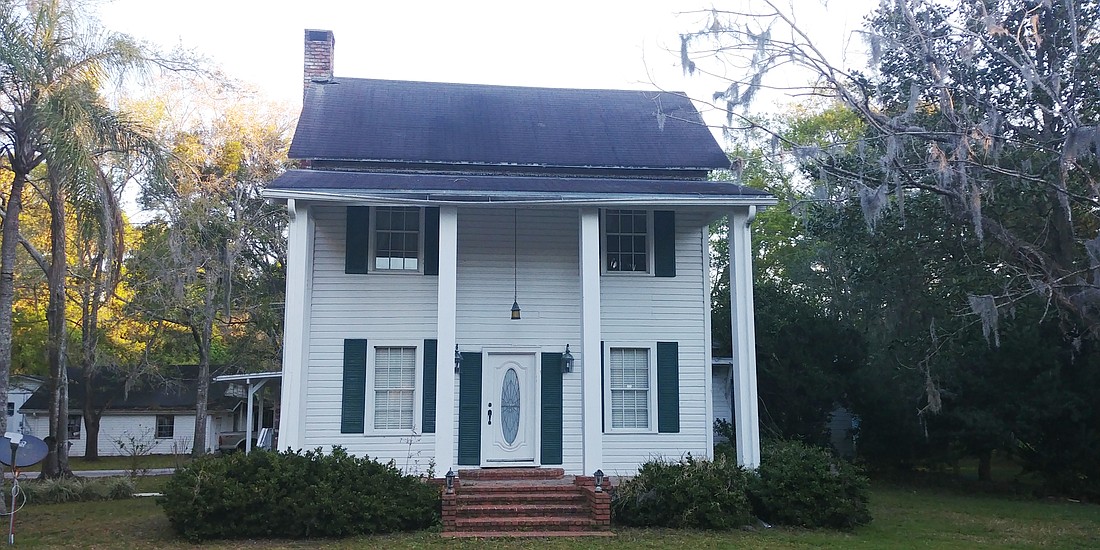
More than 7,000 people signed a petition to stop the proposed property rezoning for a subdivision along the north side of Loretto Road in Mandarin.
Those opposing the rezoning at Change.org, an online petition platform, view the site as the “historic Bowden farmstead property” comprising a historic house and farmland with a pecan grove.
Jacksonville-based developer Curtis Hart with Hart Resources LLC proposes a planned unit development with 55 70-foot-wide lots, less dense than existing development to the west and north.
The PUD ties development to a specific site plan and establishes architectural controls for the homes. Hart Resources said it is willing to preserve the historical portion of the house by relocating it on the property.
Local historian Wayne Wood wrote in his 1989 book, “Jacksonville’s Architectural Heritage,” that the two-story white house, built in 1907 for Fleming H. Bowden, is “an important link to Mandarin’s architecture.”
Wood wrote that the house, which fronts Loretto Road, exhibits the “strong vertical character” of the time. The house originally had a two-tier veranda wrapping around its right side.
He wrote that Bowden was a blacksmith and vegetable peddler who became Duval County Supervisor of Elections for 21 years until he died in 1964.
Charles and Murel Cissell bought the house and 10 acres from the Bowden estate in 1963 and added more land to total 23.59 acres.
Spencer Cissell, their son and one of the heirs, said the house needed extensive repairs when the Cissells bought it. It had been a rental property and the veranda had been removed. In 1995, Charles Cissell moved the house back 164 feet when the city widened Loretto Road.
Spencer Cissell said his father was a “horse trader,” buying and selling area land, raising cattle and farming on the property. He had a slaughterhouse and installed the white fence in 1965 to contain the cows.
Charles Cissell moved most of the buildings onto the property. Of the 23 pecan trees, eight are alive but nearly dead, Spencer Cissell said.
The four children of the Charles and Murel Cissell estate are selling the property because of the expense of upkeep.
Spencer Cissell said he would buy the property from his sisters if he could afford to do so. He also said if the developer does not want the Bowden house, he is willing to donate it.
The property has been for sale since 2018, drawing interest from developers.
The property is zoned residential rural-acre, allowing one home per acre, or potentially 23 homes. The land use designation is low density residential, like most of the surrounding property. Land to the north is zoned medium density residential.
The PUD proposes 22 more homes for the site, more than can be built by right under the current zoning.
Hart Resources said it is an infill development compatible with development in the surrounding area.
Hart said the proposed homes would sell for more than most of the adjacent homes, increasing property values.
District 6 City Council member Michael Boylan established a five-member local resident committee headed by Tracey Arpen to investigate potential impacts to the neighborhood.
Arpen served on the Comprehensive Plan Advisory Committee and is a retired city deputy general counsel and head of the Land Use and Environmental Law Department.
Arpen said concerns focus on increased density, old house preservation, Loretto Road traffic, drainage and effect on schools. The issues are:
Density: The proposed minimum lot size is larger than lot sizes allowed west and north of the site.
The house: Hart said he is willing to relocate the house to a new lot along Loretto Road. The city Planning and Development Department said the site “does not have any locally or nationally designated properties. There is an old home on the site, but it currently has no designation.”
Loretto Road traffic: The planning department analysis projects 9.44 vehicle trips per day per lot, or 519 based on 55 lots, which is 302 more than the number that can be added without rezoning.
Drainage: City and state regulations will require the development to design stormwater systems so runoff does not increase. Most of the existing housing lots to the west, between Kennedy and Gwynford lanes, are in a high-risk flood zone as determined by the Federal Emergency Management Agency, where flood insurance is mandatory.
School capacity: The planning department review of school capacity based on 56 dwelling units, at the time of analysis, shows capacity is available for the anticipated additional students in the service area.
“We hope we can find a compromise that would retain some of the character of the property but honor our legal property rights and our right to just compensation for our property. Our parents wanted no less,” Spencer Cissell said.
The first hearing with the city Planning Commission has not been scheduled.